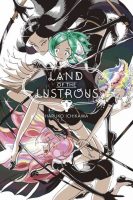My News and Reviews
Things are more or less back on regular schedule here at Experiments in Manga which means last week I posted the Bookshelf Overload for June. It was a relatively small month, especially when compared to other recent months, but I was still very excited about the various manga, comics, and other books that I picked up. Since I’m back on schedule, later this week I’ll be posting my long-overdue review of Tomoyuki Hoshino’s novel ME. Like the rest of Hoshino’s work available in English (I’ve also reviewed We, the Children of Cats and Lonely Hearts Killer in the past), the novel is challenging but I think worth the effort it takes to read.
Speaking of things that I’ve reviewed in the past, Yeon-sik Hong’s Uncomfortably Happily was a manhwa that I greatly enjoyed. The translator, Hellen Jo, was recently interviewed about her work on the comic and how she personally related to Hong’s story. Manga podcasts seem to be making a comeback these days, and I don’t see that as a bad thing. Last week saw the release of the first episode of Manga in Your Ears, a podcast featuring a few of the manga bloggers that I particularly admire, so I’m very excited to give it listen. Another interesting development that I caught wind of last week was Digital Manga’s most recent crowdfunding campaign. Juné Manga is attempting to raise funds to reprint some titles (A Promise of Romance by Kyoko Akitsu, Endless Comfort by Sakuya Sakura, and Secrecy of the Shivering Night by Muku Ogura) directly through its website rather than through Kickstarter.
Lately, I’ve been somewhat remiss in mentioning the Kickstarter projects that have caught my eye, so here’s a quick list of some of the comics campaigns that are currently running: Lucy Bellwood’s 100 Demon Dialogues is a collection of wonderful short comics exploring themes of anxiety and self-doubt; Elizabeth Beier’s autobiographical comics about bisexuality are being collected together in The Big Book of Bisexual Trials and Errors; the comics anthology Immortal Souls, which focuses on queer witches and dark magicis the followup to the excellent Power & Magic; the third and final volume of Speculative Relationships brings together a variety of science fiction romance comics; Tim’rous Beastie has a great lineup of creators whose comics take inspiration from works like Redwall, The Rats of NIHM, and Watership Down; and finally there’s We’re Still Here, an anthology bringing together fifty-five trans comic creators in what should be phenomenal collection.
Quick Takes
 Land of the Lustrous, Volume 1 by Haruko Ichikawa. Despite the frequently heavy-handed and detailed exposition present in the first volume of Land of the Lustrous, I can’t say that I necessarily understand everything that’s going in the series yet, but I am most definitely intrigued. If nothing else, Ichikawa’s illustrations are incredibly striking and I would be happy to read more of the manga for no other reason than the artwork. Twenty-eight crystalline lifeforms known as the Lustrous, each with their own unique qualities and abilities, battle for survival against the enigmatic Lunarians. Phosphophyllite wants nothing more than to fight but, being such a fragile gem, is instead given the task of writing a natural history. Though it’s said to be a vitally important job, Phos isn’t particularly pleased but comes to realize that many of the other gems aren’t wholly satisfied with their lots either. The first volume’s theme is “searching for purpose” which at this point seems to apply both to the series itself as well as to its characters. At first the narrative feels somewhat directionless, generally serving as a vehicle for stunning visuals and not much else, but once the peculiar world and characters have been thoroughly established, a tantalizing potential for greater drive and meaning begins to coalesce.
Land of the Lustrous, Volume 1 by Haruko Ichikawa. Despite the frequently heavy-handed and detailed exposition present in the first volume of Land of the Lustrous, I can’t say that I necessarily understand everything that’s going in the series yet, but I am most definitely intrigued. If nothing else, Ichikawa’s illustrations are incredibly striking and I would be happy to read more of the manga for no other reason than the artwork. Twenty-eight crystalline lifeforms known as the Lustrous, each with their own unique qualities and abilities, battle for survival against the enigmatic Lunarians. Phosphophyllite wants nothing more than to fight but, being such a fragile gem, is instead given the task of writing a natural history. Though it’s said to be a vitally important job, Phos isn’t particularly pleased but comes to realize that many of the other gems aren’t wholly satisfied with their lots either. The first volume’s theme is “searching for purpose” which at this point seems to apply both to the series itself as well as to its characters. At first the narrative feels somewhat directionless, generally serving as a vehicle for stunning visuals and not much else, but once the peculiar world and characters have been thoroughly established, a tantalizing potential for greater drive and meaning begins to coalesce.
 Sacred Heart by Liz Suburbia. Sacred Heart is Suburbia’s debut graphic novel, a completely redrawn version of her webcomic by the same name. When Ben Schiller comes across the dead body of someone she knows very early on in the comic–a moment that is acknowledged but passes with surprisingly little excitement or comment–it’s one of the first clues that something is off about the town of Alexandria. Eventually it’s revealed that all of the adults have left, supposedly to return, but no one knows when that will be. In the meantime the teenagers have the run of the place, waiting for their parents and distracting themselves from their predicament by spending their time partying and hooking up. But that can only last for so long–tensions are high and more and more people are dying under peculiar circumstances. While there is an underlying and marvelously ominous unease pervading the story, Suburbia also shows a great sense of humor in the comic. The very end of Sacred Heart was a bit abrupt and not everything is completely explained (which admittedly isn’t necessary), but for the most part I really enjoyed the comic and would be interested in reading more of Suburbia’s work. Fortunately, it seems that Suburbia has plans for three more volumes to follow Sacred Heart as sequels.
Sacred Heart by Liz Suburbia. Sacred Heart is Suburbia’s debut graphic novel, a completely redrawn version of her webcomic by the same name. When Ben Schiller comes across the dead body of someone she knows very early on in the comic–a moment that is acknowledged but passes with surprisingly little excitement or comment–it’s one of the first clues that something is off about the town of Alexandria. Eventually it’s revealed that all of the adults have left, supposedly to return, but no one knows when that will be. In the meantime the teenagers have the run of the place, waiting for their parents and distracting themselves from their predicament by spending their time partying and hooking up. But that can only last for so long–tensions are high and more and more people are dying under peculiar circumstances. While there is an underlying and marvelously ominous unease pervading the story, Suburbia also shows a great sense of humor in the comic. The very end of Sacred Heart was a bit abrupt and not everything is completely explained (which admittedly isn’t necessary), but for the most part I really enjoyed the comic and would be interested in reading more of Suburbia’s work. Fortunately, it seems that Suburbia has plans for three more volumes to follow Sacred Heart as sequels.
 Whispered Words, Omnibuses 2-3 (equivalent to Volumes 4-9) by Takashi Ikeda. While I enjoyed Whispered Words from its very start, I do feel that it’s a series that gets even better as it progresses. Though there is still a fair amount of humor, Ikeda largely moves away from the over-the-top ridiculousness found in the early series in favor of a more mature exploration of Sumika and Ushio’s changing relationship. It’s extremely unfortunate then that the quality of One Peace Books’ edition somehow manages to get even worse as it goes along. Probably most problematic is that partway through the third and final omnibus a page was skipped. The series is still readable, but the flow of the manga and the two-page spreads are completely ruined as a result. Ikeda has a tendency to develop the story by simultaneously exploring the character’s feelings and experiences from multiple points in time. It’s a technique that can be quite effective, but the printing error can make the transitions between the flashforwards and flashbacks jarring. I do believe the publisher corrected the issue of the missing page in later printings, so it’s something to be aware of and look out for. Quality control aside, Whispered Words is generally a pretty great yuri series. (It also gets bonus points from me for being about karate, too.)
Whispered Words, Omnibuses 2-3 (equivalent to Volumes 4-9) by Takashi Ikeda. While I enjoyed Whispered Words from its very start, I do feel that it’s a series that gets even better as it progresses. Though there is still a fair amount of humor, Ikeda largely moves away from the over-the-top ridiculousness found in the early series in favor of a more mature exploration of Sumika and Ushio’s changing relationship. It’s extremely unfortunate then that the quality of One Peace Books’ edition somehow manages to get even worse as it goes along. Probably most problematic is that partway through the third and final omnibus a page was skipped. The series is still readable, but the flow of the manga and the two-page spreads are completely ruined as a result. Ikeda has a tendency to develop the story by simultaneously exploring the character’s feelings and experiences from multiple points in time. It’s a technique that can be quite effective, but the printing error can make the transitions between the flashforwards and flashbacks jarring. I do believe the publisher corrected the issue of the missing page in later printings, so it’s something to be aware of and look out for. Quality control aside, Whispered Words is generally a pretty great yuri series. (It also gets bonus points from me for being about karate, too.)

